Charles “Chuck” Feeney 1931-2023
Billionaire philanthropist and member of the Irish America Hall of Fame Chuck Feeney died in October, aged 92. A wildly successful entrepreneur, Feeney’s work ethic was equaled only by his goodwill. Combining the two, he founded and funded philanthropic organizations to distribute nearly all the fruits of his labors during his lifetime to causes he cared about passionately, not least education in Ireland and the Irish peace process.
Born and raised in Elizabeth, New Jersey, Feeney was a second-generation Irish American with roots in Kinawley, County Fermanagh. After graduating from St. Mary of the Assumption High School, he served in the U.S. Air Force in World War II and attended Cornell on the G.I. Bill; having completed his degree with four months’ worth of tuition left, he moved to France to attend the University of Grenoble, where he would live for several years, starting a family and a business: Duty-Free Shoppers. Though the practice of duty-free sales had been tested to some success in Shannon Airport, the industry soared in the hands of Feeney and his partner Robert Miller, a fellow Cornell alum.
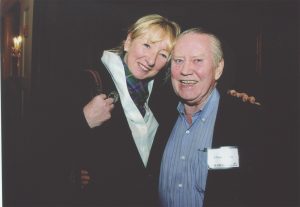
In 1988, Feeney’s estimated worth of $1.3 billion garnered him a space in the top 20 of Forbes magazine’s 400 richest people. This was (forgivably) inaccurate: he had actually turned over all of his 38.75 percent interest in the company to The Atlantic Philanthropies in 1982, without word or ceremony. As it turned out, Feeney’s taste of the high life was not as satisfying as using his good fortune to make a difference.
Taking to heart Andrew Carnegie’s admonition that a man who dies rich “dies disgraced,” Feeney began a four-decade campaign of aggressive philanthropy, donating a total of $8.6 billion to establish a public health system in Vietnam, providing wide-range access to AIDS drugs in Africa, put an end to the Troubles in Ireland.
An estimated $2 billion went to Ireland alone for the development of political stability as well as public and higher education, and Feeney’s initial investment in the Irish-American Partnership enabled the organization to open its New York office.
He lived a comparatively modest life, keeping only what he needed for relative comfort and giving the rest away.
“What was so astonishing was his wish to be ordinary,” founding president of the University of Limerick Ed Walsh told Irish America in a profile on Feeney. “He has a very simple way of life. He cherishes fundamental values. He puts us all to shame. If Chuck Feeney was not a very successful businessman he would be a very successful Benedictine monk.”
Though he painstakingly shunned public attention and what he called “these mutual admiration society dinners” in his interview for the Irish America Hall of Fame, Feeney did pay this magazine the highest of compliments by making an exception to attend several of Irish America’s functions.
“Chuck Feeney was truly one of a kind among billion-dollar philanthropists,” noted fellow philanthropist Warren Buffett in a tribute on the website for The Giving Pledge initiative, which owes its inspiration in part to Feeney and his revolutionary take on giving. “No one in that category – certainly including me – except Chuck has given away sums which required that they change their own personal living standard. Chuck basically gave it all away while he had years left to live.”
“It’s a lot more fun. Giving gave me a lot of pleasure,” Feeney explained to Irish America. “I guess it’s a simplistic statement but the good that’s done lives on.”
“His vision, generosity, and pioneering view of philanthropy have transformed countless lives on the island of Ireland,” said Mary Sugrue, chief executive of the Irish-American Partnership, in an online tribute to Feeney. “Though often used, never more true: ní bheidh a leithéad arís ann, we shall not see his like again.”
“So much of what has been achieved in Irish third-level education owes so much to his generous gifts to so many institutions,” President Michael D. Higgins said in a tribute to the late philanthropist.
“Through his selfless commitment to so many important causes, Chuck Feeney’s work was founded on the core principles of inclusivity, participation, and fairness.
“He has left a deep and lasting effect on the lives of so many people in our country, providing opportunities for participation and improving conditions within our society.”
Stressing the importance of recognizing Feeney’s contribution to peace and reconciliation in Ireland, Higgins went on to say:
“The Irish people will remain deeply appreciative of his quiet and generous work in moving the process forward, while also providing funding for important reconciliation and regeneration projects.”
Angus Cloud 1998-2023
Breakout television star Conor “Angus Cloud” Hickey died in late July 2023; he was 25 years old. In the early stages of a promising career, Cloud was best known for the role of Fez O’Neill in HBO’s Euphoria.
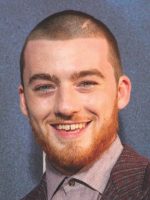
The only son of Lisa Cloud and Conor Hickey, a County Meath native, Cloud and his two sisters were raised in Oakdale, California. He fit an active and eventful life into a very short amount of time, even after sustaining minor brain damage at 15 when he fell from his bicycle into a construction pit and had to pull himself back out. Though the incident did leave him with a visible scar and slow-paced speech, Cloud considered himself “blessed” and referred to the lingering effects in a 2019 Variety interview as “so minor it ain’t even really worth speaking about.”
“He was given 10 bonus years and filled them with creativity and love,” Cloud’s mother said in a Facebook post after his passing. Several of those years were spent in the spotlight for his role in Euphoria, for which he was scouted from the street in Brooklyn, where he was working as a waiter. Casting director Jennifer Venditti found in Cloud a master of subtlety and expression, the model of gritty realism she was looking to cast, and became his most passionate champion. Both were frustrated by the fact that his performance was received almost too well – audiences thought Cloud was simply playing himself. “It’s not that simple. I brought a lot to the character,” he told Variety.
“It’s not just showing up and being yourself on camera. I’m really proud of him. Angus doesn’t get enough credit,” Venditti confirmed, and elaborated later in her social media tribute addressed to Cloud. “Your gift of active listening was just off the charts,” she wrote. “You didn’t need to speak, your eyes said it all. Your kind heart, the life you had lived, and the sensitivity of your soul understood it all.”
Cloud’s passing followed that of his own father, Conor Hickey, with whom he had a fiercely close bond, by just two weeks. Hickey was a former captain of the Ashbourne Rugby Club in County Meath, who returned annually to reminisce at the Rolestown Inn years after migrating to the U.S. They leave behind Cloud’s mother, Lisa, and sisters Molly and Fiona.
Bronwyn Conroy 1938-2023
Pioneer businesswoman Bronwyn Conroy, who founded the first beauty school in Ireland, died in early June; she was 85. Conroy set the bar for salons and technicians across the country, and her knowledgeable, dedicated training made her students competitive on a global level.
Born and raised in Salthill, County Galway, Conroy pursued a degree in science at the University of Galway before taking a job at her parents’ behest with Aer Lingus – on whose flights her products would later be distributed to passengers as luxury items – as a ground hostess in Shannon Airport. She soon realized her vocation was in cosmetics and made it her business to work her way up from the bottom, basically apprenticing for free at Lydons Pharmacy in Galway until her passion and success turned into a paying job. “The women would ask for Ponds’ vanishing cream and I’d move them up to Charles of the Ritz Skin Bloom,” Conroy said in an interview with the Irish Times. “They’d come in looking for one thing and they’d leave with five.” From Lydons she was handpicked to work for the brand Helena Rubenstein, eventually becoming the director of training.
In 1972, she opened Bronwyn Conroy International Beauty School’s first branch in Dublin and garnered an impressive reputation by hiring international examiners and establishing standard, trusted practices for her “Bronwyn girls”. She then developed her own line of skincare and cosmetics and ran a column on the subject in the Sunday Press for 25 years. Yet despite her significant accomplishments, Conroy remained grounded and gracious. “I used to love when Bronwyn visited on Fridays to have a chat and pass on knowledge,” former student of the beauty school Máire Lewis posted in an online tribute. “She was so elegant, charming, and she oozed grace.”
Conroy leaves behind her sister Virginia, daughters Sherna and Bronwyn, and grandchildren Ella, Zoe, Ollie, and Paddy. She is preceded in death by her first husband, Liam Malone.
Peter Harbison 1939-2023
Renowned archaeologist and cornerstone of Irish tourism Dr. Peter Harbison died in late May at the age of 84. Harbison was one of the most trusted names in his field, known the world over for his guidebooks to the vast cultural and historical riches of Ireland and his talent for making the oldest and most unassuming of historical sites accessible and relevant to scholars and tourists alike.
Raised in Dublin by parents Austin and Sheelagh (née MacSherry), Harbison received his undergraduate and master’s degrees in Celtic Archaeology at University College Dublin before earning his doctorate of philosophy at Marburg University. While in Germany, he met paleontologist Edelgard Soergel, whom he married in 1969.
While he was best known for Guide to the National Monuments of Ireland, colloquially dubbed “the Harbison”, and most critically celebrated for The High Crosses of Ireland, Harbison’s writings were as prolific as his curiosity was earnest. “I’ve written about 38 books, and I’m not finished yet!” he chirped in a virtual segment for the Royal Irish Academy in 2020. Adding 28 co-authored doesn’t approach the full contents of his catalog. Though his ambitions of an academic position were never fully realized, his posts as Bord Fáilte’s archaeologist and editor of its international magazine Ireland of the Welcomes and honorary academic editor of the Royal Irish Academy produced a competitive body of work.
UCD honored Harbison with an honorary doctorate in 2022. “He is that rare breed: a serious scholar who is also a great populariser,” his introduction hailed, highlighting his National Monuments guide. “It alerted people to our ancient and medieval sites, it explained what things were, and it identified where the key-holders lived. The only people who did not love his book were the key-holders. They never had a peaceful, uninterrupted, Sunday lunch again!”
“He was a very personable man who could talk to anyone, anywhere, and have a conversation that was just great fun for all participants,” Harbison’s son John recalled during his eulogy, noting that his father’s desire to engage prevailed even after having his leg amputated. “He discovered very quickly upon wearing branded sports clothing that while you’re in a doctor’s waiting room you could very easily engage in conversation with just about anybody, on every topic, starting with sports. And for that reason, branded sports clothing increasingly became something that Peter liked in his wardrobe.”
Harbison was predeceased by his wife Edelgard in 2008 and his brother John in 2021. He is mourned by his sons John, Maurice, and Ronan; grandchildren Alex, Gabriel, and Cordelia; and step-grandchild Edith.
Joseph Leary 1933-2023
Joseph F. Leary, a leader in Boston’s Irish-American community since the 1980s, passed away peacefully, surrounded by his loving family on September 18, at age 90. Preceded in death by his wife, Eileen (Sullivan) Leary in 1981, Joe is survived by his two children, Joseph of South Boston and Eileen and her husband Thomas Johnson of Boston and Harwich Port.
Prior to attending Boston College, Joe served in the US Army as a Military Policeman out of Fort Jay in New York City and worked for the Gillette Company in sales for nearly 30 years.
In 1988, the newly formed Irish American Partnership selected Joe as its president and CEO. The non-profit organization, which was endorsed early on by House Speaker Tip O’Neill and others, with a mission to create a ‘strong, healthy Ireland through economic development, job creation and education.” Leary served as president for 28 years until his retirement in 2016, when he became president emeritus.
The Partnership, run since 2016, by CEO Mary Sugrue of Cahersiveen, County Kerry, has raised over $56 million in support of educational and community organizations within Ireland since it was first formed. The Partnership has focused in particular on education funding in rural schools that need it the most, particularly in the west of Ireland. In an email to Irish America’s editor, Mary recalled her first meeting with Joe.
“Thirty-five years ago, I arrived in Joe’s office fresh off a flight from Shannon to interview for a job with the Partnership. In the decades that followed, Joe became my mentor, a cherished colleague, and a close friend. He was a true Irish American, and a great character! Ar dheis Dé go raibh a anam dilis.”
In a statement released by the Partnership, Sugrue elaborated on Leary’s role in the community and his love of Ireland: “Today, we mourn the loss of a bastion of the Irish-American community and my close friend and mentor, Joe. It is hard to believe he is gone, but his dry sense of humor, quick wit, and unending love of Ireland will live on in our fond memories. My thoughts are with his family and friends as they celebrate the life of a dedicated and passionate ambassador for Ireland and irreplaceable member of the Boston Irish community.”
A Mass of Christian Burial was being celebrated in Our Lady of the Visitation Parish, Saint Elizabeth Church, 350 Reedsdale Road, Milton on Monday, September 25 at 10 a.m.
Please consider a donation to the Irish American Partnership or the Dana Farber Cancer Institute in Joe’s memory. – Michael Quinlin
Cormac McCarthy 1933-2023
Award-winning Irish-American author Charles “Cormac” McCarthy, Jr. died in June, aged 89. The writer’s prolific body of work was offset by a taciturn personality that shunned the spotlight for most of his career, preferring to let his endeavors speak for themselves. His literary prowess earned him a Macarthur Genius Grant, a Pulitzer Prize, a National Book Award, and more.
Born one of six children in Providence, Rhode Island and raised in Knoxville, Tennessee by Charles Sr. and Gladys McCarthy (née McGrail), McCarthy was a second-generation Irish American with roots in County Cork. He proved a contrarian from the start, discontent with his surroundings of relative privilege as the son of a lawyer. “I felt early on I wasn’t going to be a respectable citizen,” he told the Washington Post in 2009. Two attempts to complete a degree at the University of Tennessee were broken by a four-year stint in the Air Force, during which he read voraciously.
He published his first novel, The Orchard Keeper, which won an award from the William Faulkner Foundation, in 1965. His successive works steadily accumulated acclaim, culminating with The Road, which garnered 2007’s Pulitzer Prize for fiction. McCarthy’s refusal to capitalize further on his projects was a grievance cited more than once in three marriages, making his living inconsistent and often uncomfortable. But he held firm. “Some things are very nice, but they certainly take a distant second place to being able to live your life and being able to do what you want to do,” he told Oprah Winfrey in a rare interview in 2007. He gave even less thought to popular opinion of his books. “You would like for the people that would appreciate the book to read it. But, as far as many, many people reading it, so what?”
Tributes to McCarthy flowed on social media, most dominated by excerpts of his writing, which readers found evocative even in its often grotesque brutality. “It’s some of the most extraordinarily beautiful writing I’ve ever seen, and it’s horrifying,” noted Rutgers professor J.T. Barbarese to NPR, likening McCarthy to William Faulkner and F. Scott Fitzgerald in that respect. “To describe menace and horror in such a way that you just cannot disengage, that’s greatness.”
McCarthy is survived by his brother Dennis, sisters Barbara Ann and Maryellen, sons Cullen and John, and two grandchildren.
Globally acclaimed singer and social activist Shuhada’ Sadaqat, originally and professionally known as Sinéad O’Connor, died in late July, aged 56. O’Connor’s pure, haunting voice, passion for uplifting the oppressed, and raw vulnerability made her a brilliant, if often notorious, star of the music industry.
O’Connor was born in Glenageary, Dublin, to John and Johanna O’Connor, who separated when she was eight. One of the few bright spots in a troubled childhood plagued with abuse by her mother was the gift of a guitar from a nun in An Grianan Training Centre, a Magdalene laundry-turned-girls’ institution. “I suppose I’ve got to say that music saved me,” O’Connor told the Irish Independent in 2013. “I didn’t have any other abilities, and there was no learning support for girls like me, not in Ireland at that time. It was either jail or music. I got lucky.”
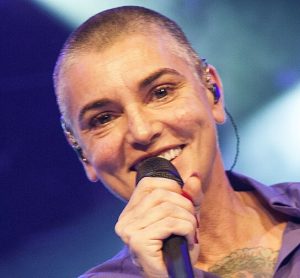
She produced her first album, The Lion and the Cobra, to both critical and popular acclaim in 1987, and shot to Billboard #1 in 1990 with Prince-written “Nothing Compares 2 U” on her second. The music video banked heavily on stark close-ups of O’Connor’s close-cropped head and large eyes that knew pain without numbing to it. Her uncontrived aesthetic was a thorn in the side of her label’s executives, who “wanted me to wear high-heel boots and tight jeans and grow my hair,” she revealed in a 1991 Rolling Stone interview. “ I decided that they were so pathetic that I shaved my head so there couldn’t be any further discussion.”
After refusing a Grammy on grounds of materialism in the industry, the unauthorized choice to tear her mother’s picture of Pope John Paul II during her guest spot on Saturday Night Live in 1992 told the world that no amount of success or backlash at stake would keep O’Connor from expressing herself as she saw fit. Intended to call attention to child abuse at the hands of clergy in Ireland (for which she would later be praised), all the stunt did at the time was make her one of two women banned from the show and rouse bitter, lasting vitriol against her. “The media was making me out to be crazy because I wasn’t acting like a pop star was supposed to act,” she told the New York Times in 2021. “I didn’t want to be a pop star, I wanted to be a protest singer.”
Defying expectations was one of O’Connor’s few consistencies in subsequent years, storied with multiple marriages, public and volatile spats with fellow artists, religious conversions, political realignments (notably supporting, then renouncing both the I.R.A. and Sinn Féin), mental health diagnoses (bipolar disorder, revised to post-traumatic stress disorder), career retirements and relaunches, and name changes. The loss of her son Shane to suicide in 2022 was a crushing blow from which she would never recover. Through it all, she wore vulnerability defiantly on her sleeve, and in doing so was among the most unabashedly human of public figures.
Tributes to O’Connor poured out from all over the world, including British singer Alison Moyet’s: “Astounding presence. A voice that cracked stone with force and by increment. As beautiful as any girl around and never traded on that card. I loved that about her. Iconoclast.” Yet somehow there is no more fitting elegy than the heartfelt anthem folk singer Kris Kristofferson, one of O’Connor’s most earnest and longest-lived friends in the industry, released in the aftermath of her SNL appearance. He appealed, “She told them her truth just as hard as she could / Her message profoundly was misunderstood / […] But some candles flicker and some candles fade / And some burn as true as my sister Sinead.”
O’Connor is survived by children Jake, Roisin, and Yeshua, and is predeceased by her son Shane, who died by suicide in 2022. ♦

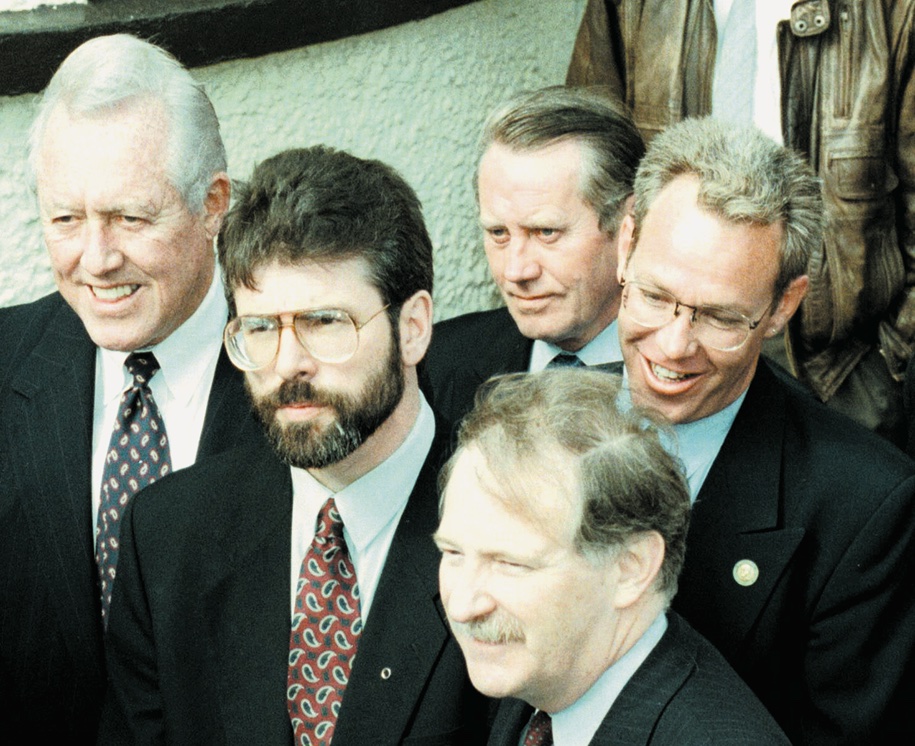
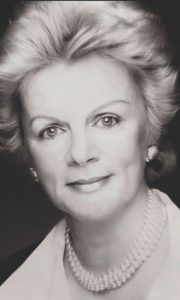
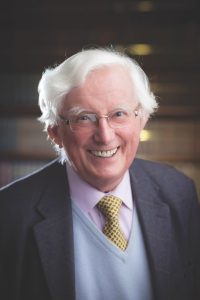
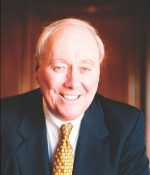
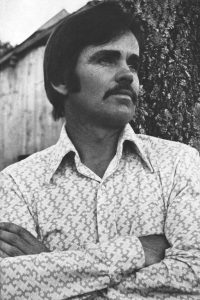
Leave a Reply